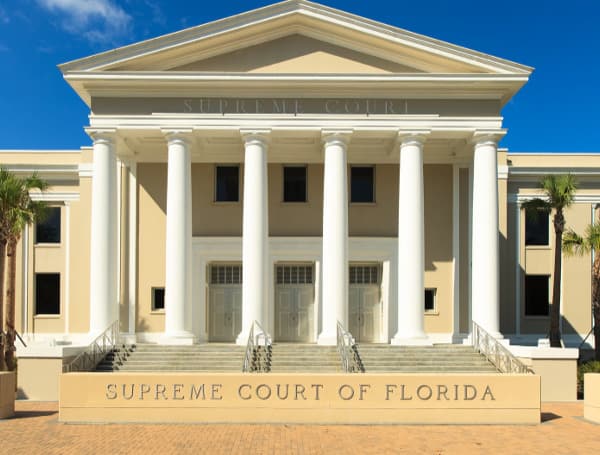The Florida Supreme Court on Thursday said it did not find a need to consolidate judicial circuits, after prosecutors, public defenders, judges, sheriffs and other officials from across the state opposed the idea.
The Supreme Court, which has authority to make recommendations to the Legislature about changing judicial circuits, issued a five-page unanimous decision that came after a committee last month recommended against consolidation.
“We have considered the committee’s report and recommendation. And we ourselves have evaluated the issues relevant to consolidation, guided by (criteria in a court rule),” the Supreme Court decision said. “Based on the committee’s findings and recommendations and on our own independent judgment, we do not find that there is a need to consolidate Florida’s judicial circuits.”
Read: Florida AG Moody, Gov. DeSantis File Suit Against Biden Admin On CO2 Emissions Targets
Chief Justice Carlos Muniz in July issued an order establishing the committee after House Speaker Paul Renner, R-Palm Coast, raised the idea of consolidation. In a June 15 letter to Muniz, Renner said the “boundaries of Florida’s judicial circuits have been unchanged for decades despite significant population and demographic changes during that timeframe.”
“The size of our judicial circuits varies widely, ranging from approximately 2.7 million people (in the Eleventh Circuit) to less than 100,000 people (in the Sixteenth Circuit),” Renner wrote. “I believe that the consolidation of circuits might lead to greater efficiencies and uniformity in the judicial process, thereby increasing public trust and confidence. I also believe that the consolidation of circuits would result in improved economies of scale in the judiciary’s back-office operations, leading to substantial cost savings for Florida’s taxpayers.”
Renner’s office issued a statement after Thursday’s decision saying the speaker does not plan to continue pursuing consolidation.
“The speaker put forward a thoughtful and timely request to review how our courts are structured hoping to find economies of scale to better serve Floridians,” the statement said. “We appreciate and accept the Supreme Court’s opinion and thank the committee for their diligent work in presenting their recommendations. We do not intend to bring any legislation forward this year regarding circuit court consolidation.”
Read: New Hampshire Man Charged Threatening To “Disembowel” And Shoot 3 Presidential Candidates
Florida has 20 judicial circuits, and consolidation would result in a smaller number. Renner’s June letter referred to the 11th Judicial Circuit, which is made up of Miami-Dade County, and the 16th Judicial Circuit, which is made up of Monroe County.
State attorneys, public defenders, judges, sheriffs, other elected officials, lawyers and members of the public spoke out against consolidation as the committee looked at the idea.
Critics argued, in part, that consolidation could diminish access to courts for lower-income people and rural residents, pose logistical problems and be costly. Some also alleged it was a Republican attempt to weaken Democrats’ power in the court system.
Rep. Anna Eskamani, D-Orlando, issued a statement after Thursday’s Supreme Court decision that said it “reflected overwhelming statewide opposition to the concept of judicial consolidation.”
“This is a conservative state Supreme Court opposing what is a conservative idea — my hope is that all talks about judicial consolidation within the Legislature will now come to an end, and we will instead focus on funding our court systems and ensuring that every person has swift access to the legal system,” Eskamani said.
The review of circuits came after lawmakers last year approved creating a 6th District Court of Appeal, following decades of Florida having five courts of appeal. That change, which took effect Jan. 1, also involved revising the jurisdictions of the 1st District Court of Appeal, the 2nd District Court of Appeal and the 5th District Court of Appeal. In some cases, judges had to change districts.
Judicial circuits have their own judges, state attorneys and public defenders. In addition to the Miami-Dade and Monroe circuits, three other circuits are made up of one county each — Broward, Hillsborough and Palm Beach.
By contrast, the 3rd Judicial Circuit is made up of seven rural North Florida counties — Columbia, Dixie, Hamilton, Lafayette, Madison, Suwannee and Taylor. The 2nd Judicial Circuit, the 8th Judicial Circuit and the 14th Judicial Circuit, which are spread across other parts of North Florida, each have six counties.
Android Users, Click To Download The Free Press App And Never Miss A Story. Follow Us On Facebook and Twitter. Sign up for our free newsletter.
We can’t do this without your help. Visit our GiveSendGo page and donate any dollar amount; every penny helps.

